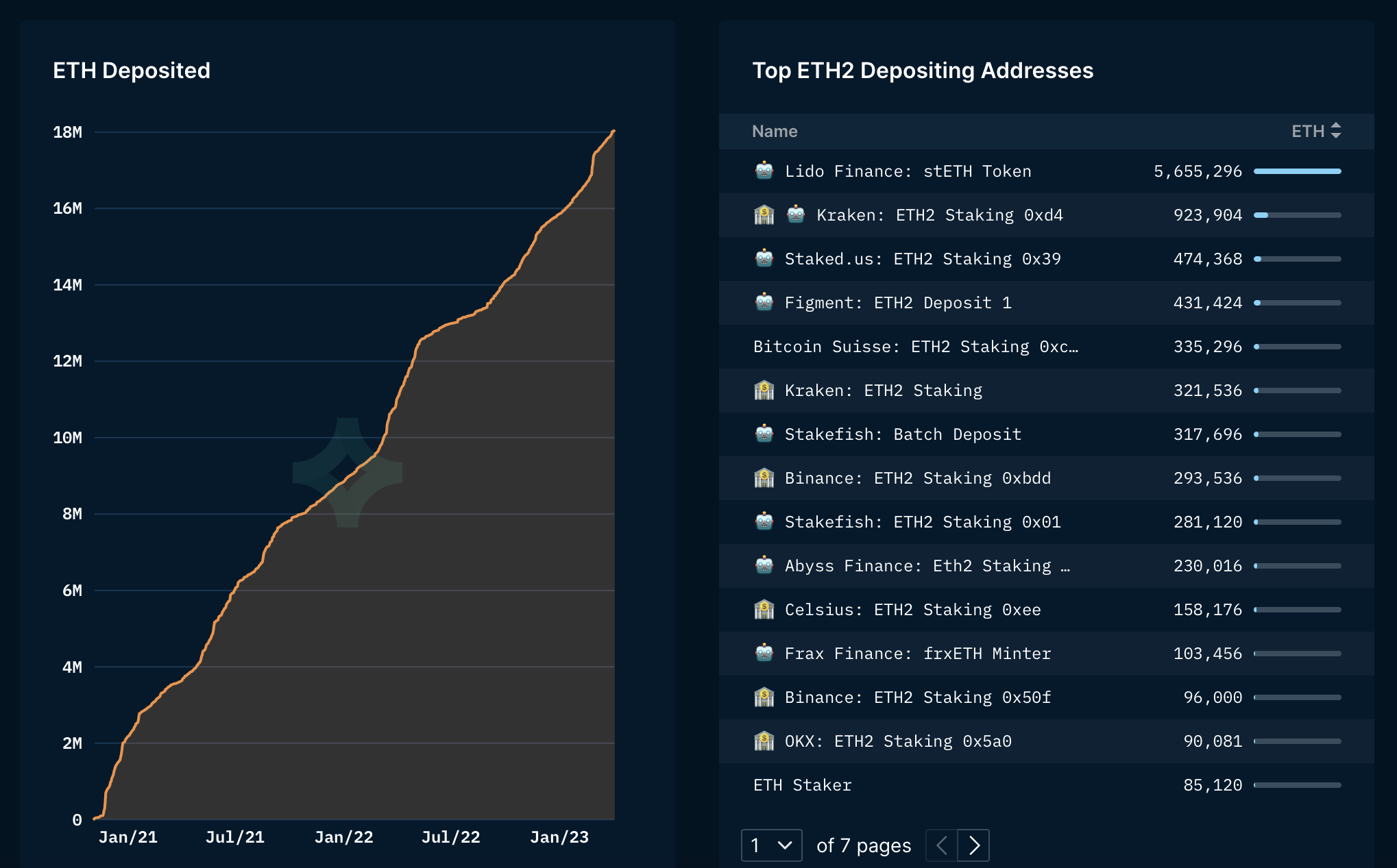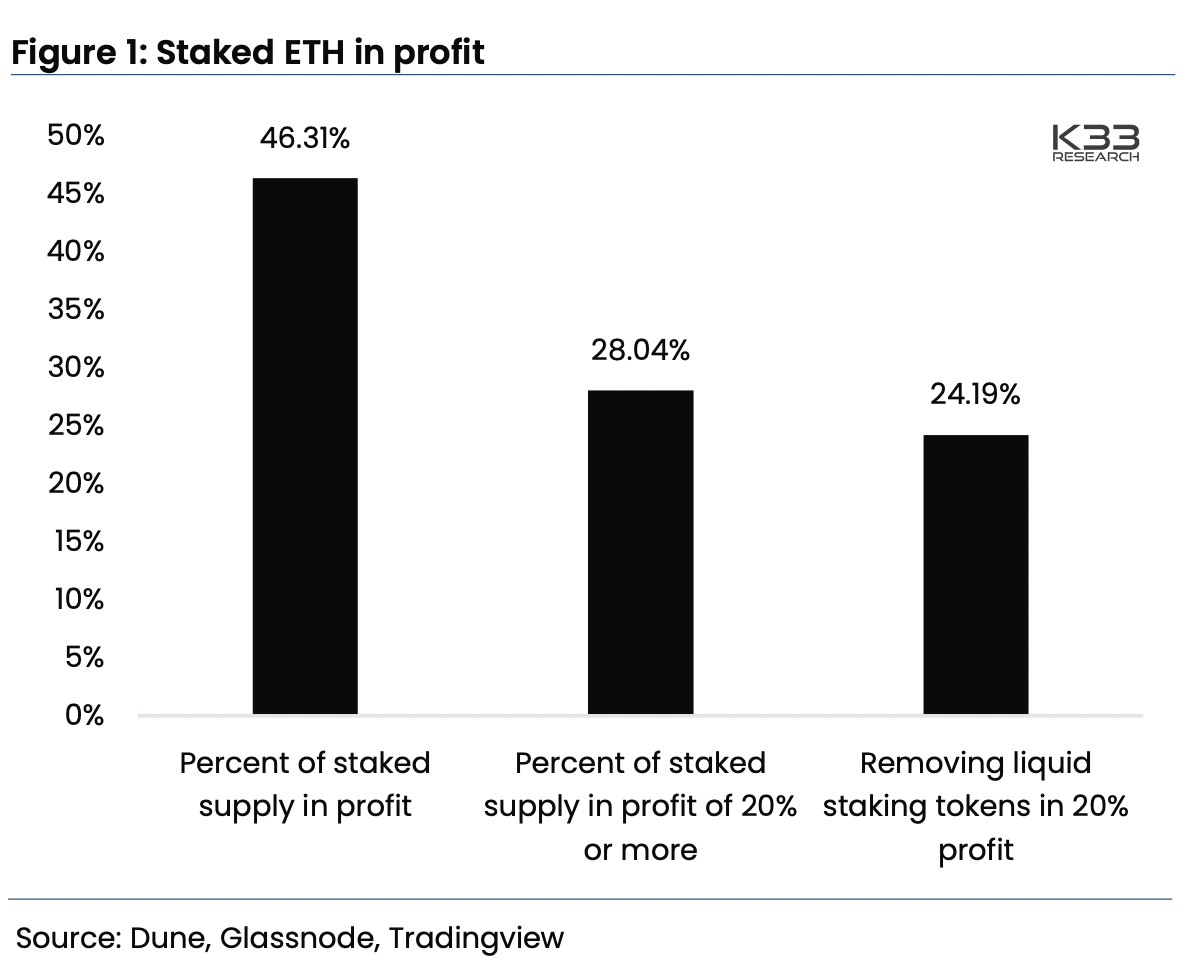Ethereum’s backward-incompatible Shapella hard fork or Shanghai upgrade, slated to happen in eight days, will let users withdraw their "staked ether."
The lingering fear in the market is that the impending unlocking of ETH deposited in the network to boost security in return for rewards will see some holders rush to exchanges to liquidate their tokens.
According to some observers, the resulting increase in selling pressure could be worth a couple of billion dollars.
"1.1m ETH related to partial reward withdrawals could face the market, while Celsius is likely to sell its 158k staked balance as part of its bankruptcy process. These two numbers represent nearly 1.3m ETH or approximately $2.4bn worth of potential sell-side pressure to face the market," analysts at K33 Research said in a note to clients on Tuesday.
More than 18 million ether has been staked in the network since the Beacon Chain went live in December 2020.
While the entire balance cannot be unstaked immediately after the upgrade, about 1.1 million coins earned as rewards for staking are instantly withdrawable. Ether stakers are paid rewards in ETH.
Additional selling pressure could come from the bankrupt crypto lender Celsius liquidating its staking balance of 158,176 ETH to recover at least a portion of creditors' funds.
Per K33, San Francisco-based cryptocurrency exchange Kraken, which recently came under the regulatory hammer for failing to register the offer and sale of their crypto-asset staking-as-a-service program, is likely to unstake all ETH staked by stateside investors. At press time, the number of ETH staked through Kraken was 1.2 million.
"Kraken will unstake all ETH staked by U.S. investors as a result of its Wells Notice, this could entice some of Kraken's ETH stakers to sell," analysts noted.

More than 18 million ETH have been locked into the network since December 2020. (Nansen) (Nansen)
Big sell-off unlikely
The expected supply boost of more than $2 billion amounts to just 20% of ether's average daily trading volume, according to data sourced from Coingecko.
Partial withdrawals are likely to take between 5-6 days to process, and full withdrawals three weeks and four months, according to an analysis by 21Shares.
In other words, the selling pressure will likely be distributed over several days, allowing buyers to match the selling pressure.
"Thanks to the modest daily limit on the original 16.27mn ether, this potential selling pressure is evenly distributed over a long time. This should allow buyers to match the selling pressure without much impact on the price," Saxo Bank's cryptocurrency analyst Max Eberhardt, said in the Shanghai Upgrade preview.
Eberhardt added that a large share of ether shakers are long-term investors and are unlikely to liquidate their holdings after the upgrade.

Just over 46% of ether staked is in profit as ether's current market price is higher than the rate prevalent when these coins were locked in the network. (K33 Research) (K33 Research)
The chart by K33 shows 46.3% of ether staked is in profit as ether's going market rate is higher than the rate prevalent when these coins were locked in the network. Meanwhile, 28.04% of ether staked is sitting on a profit of more than 20%.
That number drops to 24.2% if we exclude coins staked through liquid staking services offered by Lido and Coinbase. Per K33, 66% of this 24.2%, amounting to 16% of all ETH staked, was deposited before February 2021 by long-term investors.
"The lion’s share of this group is unlikely to unstake any substantial amount as ETH trades 63% below its ATH," analysts at K33 said. "Tokens associated with liquid staking derivatives are unlikely to be unlocked to be sold."
Ether changed hands at $1,910 at press time, representing a 60% gain year-to-date gain, per CoinDesk data.








